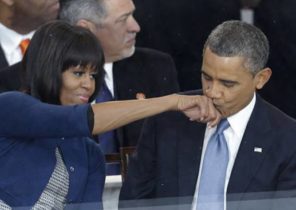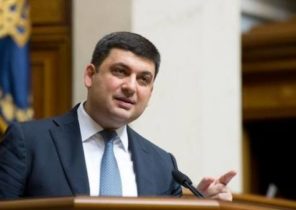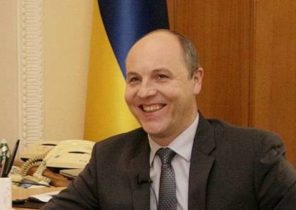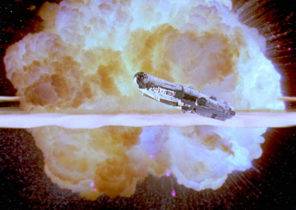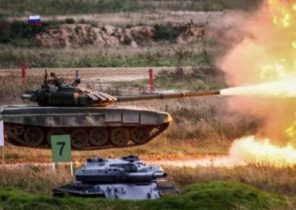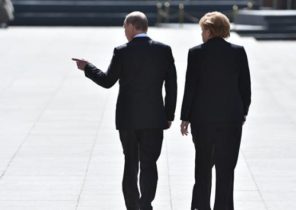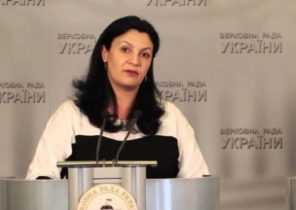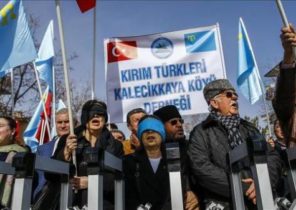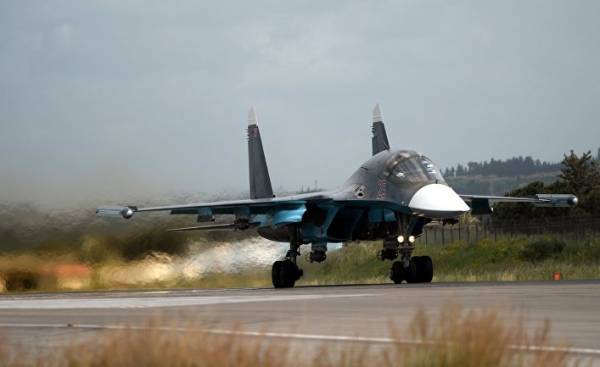
In the art of government there is one Golden rule: never bluff. It is the second Golden rule: be prepared when you are challenged. Barack Obama, and now Vladimir Putin, faced with these rules in Syria. Applied last week on Syria missile attack was not just a demonstration of American military power. He put on his head the whole logic of Putin’s military adventure in this country. In the blink of an eye all the calculations of Russia in the middle East from winning has turned into losing. Because of this, missile strike, Putin was on the edge of a high cliff. And go down it will be very difficult.
In 2012, former President Barack Obama asked dubious to superpower standards of the bluff, after his infamous “red lines” in connection with the use of chemical weapons in Syria. In fact, there are no lines there. When the Syrian dictator Bashar al-Assad has solved this bluff, he has demonstrated that the American threats to give false. That’s why bluffing is a bad choice for President. President Theodore Roosevelt explained it over 100 years ago: “When I can’t keep my word, I will never bluff. To threaten and rend the air and then fail to deliver on their promises — what could be worse?”
Failing to carry out his threats, Obama has shown that around Syria, formed a power vacuum which was later filled by Putin. In the absence of the US, the Kremlin may boast of its status as a great power and to act in Syria to the role of the Supreme court, supporting Assad and showing the world that Washington talks, and Moscow acts. This is also a bluff, as the Kremlin just took advantage of the gap in the “red line” Obama. Moscow has never intended to risk a direct military conflict with Washington in the middle East because of Assad.
First broken “red line” for Russia was deceptively attractive. The Americans were in the backyard, and Russia was able to climb the ladder of military escalation in the middle East is fairly easy, low risk and detriment of their interests. There were other additional benefits. In Syria, Russia will have the opportunity to test his high-tech weapons and military equipment of new generation, showing the progress of the ongoing modernization in the army. Over time, Americans could draw in and involve some form of formal cooperation with Russia in the fight against ISIS (banned in Russia organization — approx. TRANS.) It could force the Americans may be hesitant, but to recognize that Assad has a future. And in the best case cooperation in the fight against ISIS could have forced Washington to abandon its goals in Ukraine. According to the scenario of international adventurism, Syria was a win-win option.
However, this country has never been Russia’s main rate. The main strategic interests of Russia have always been and will be in the European theater. Here the Russian leaders have long considered that a European security system under American leadership is unnatural, unfair and behind the times. In Europe, Russia sees the main vector of American threats — after all, the US “took in the ring of the siege,” the North Atlantic Alliance. And in Europe, the Kremlin strives to regain the old order, abolishing the system that emerged after the cold war. The main goal of Russia is to force the West to accept that Moscow has a privileged sphere of influence. These areas are not precisely determined, but according to the Kremlin, they exist in geopolitical purgatory, somewhere between Berlin and Moscow. It is in Europe, not in Syria, Russian leaders are willing to go to escalate the conflict and to fight if necessary.
The trouble with small countries is that they can draw great power in a war that she doesn’t need, and in which it will not win. Use chemical weapons against the civilian population (possibly with the assistance or acquiescence of Russia), Assad has once again violated the vaunted American “red lines”. But this time President Donald trump reacted, and very effective. It was a counter-demonstration of the rejection of the usual manners of the United States. The shelling of Assad’s air force base Chirata showed that trump is willing to use force in Syria. He also signaled that Russia would be very difficult in the middle East.
Americans their missile strike knocked the escalation ladder from under the feet of Russia. Because of this, Moscow has hung on very high and very dangerous cliff. Now she is in a losing situation. Low-cost and not very dangerous bet in Syria, suddenly become extremely risky and expensive. Putin has few good options. In fact, they are only four.
The first option. To ignore the problem. To do nothing is also an option. But in this case would dramatically weaken Russia’s credibility and level of trust to it from Syria, Iran, China and middle Eastern countries. That’s why bluffing is not worth it. Another drawback of ignoring the problem is embarrassing and a shame in the country. This could be a serious blow to the political authority of Putin. To lose credibility and weight in the eyes of foreign customers, the restless enemies of the Russian people, and especially from the centers of power is Putin’s reckless and even dangerous.
A variant of the second. Escalation. If you can’t climb down, keep climbing up. Escalation is the most negative option for Moscow, as he brings her close to a serious conflict with the United States. Russian military doctrine seeks to avoid this outcome by all possible means. Unfortunately, the chances of the occurrence of useless war most of all on the top steps of the escalation ladder. And there is currently Putin. The first reaction of the Kremlin on the missile strike was a kind of gunboat diplomacy in the Mediterranean, and is a hint of escalation. However, the Russian economy is not ready for the big war. The program of military modernization was not completed. Escalation could end badly for Putin.
The third option. To divert the attention. It’s somewhere between ignoring and escalation, and this is possible in many different ways. For Russia it is extremely important to divert world attention away from Syria, focusing it on some other problem. First and foremost comes to mind the intensification of the conflict in Eastern Ukraine, or test the strength of NATO defense in the Baltic or the Black sea. The lack of distraction lies in the fact that there are costs as from the first and from the second variant. Diverting attention, Putin is in any case not solve the problem of his own credibility in Syria, and will not eliminate the danger of a large-scale conflict with the West.
Option four. Discharge of tension. The removal of tension in relations with the USA is clearly the best way for Russia. This reduces the chances of occurrence of unnecessary conflict. Changing old ideas about the weakness of Kremlin will come admiration for his statesmanship. The quarrel and subsequent reconciliation of Russia with Turkey over downed in 2015 the plane is an example of such a discharge. After the formal discharge of the military hysteria, Moscow began to negotiate. Discharge — it’s a lifeline, because all is safely away from the edge. But this option is in any case should not be confused with normalization. Discharge is only the first step. A normalization will occur later.
When the smoke clears, there should be no doubt that the American missile strike against Syria — is informed, important and necessary step. Everything points to the fact that the team of national security trump did his job exceptionally well. It is an added bonus as this team is still very young. Countermeasures trump in Syria also shows why democracies are very beneficial to regularly change their leaders, and why the refusal of the dictators to resign from his posts is detrimental to their countries. When an authoritarian state is dangerous escalation, as happened in Syria, it is very difficult to reduce tension after the situation changes. Now the next step for Putin. Let’s hope that it will give preference to a lifeline.
Peter Doran, Executive Vice President of the Center for European policy analysis (Center for European Policy Analysis). He writes about guns, oil and freedom.
